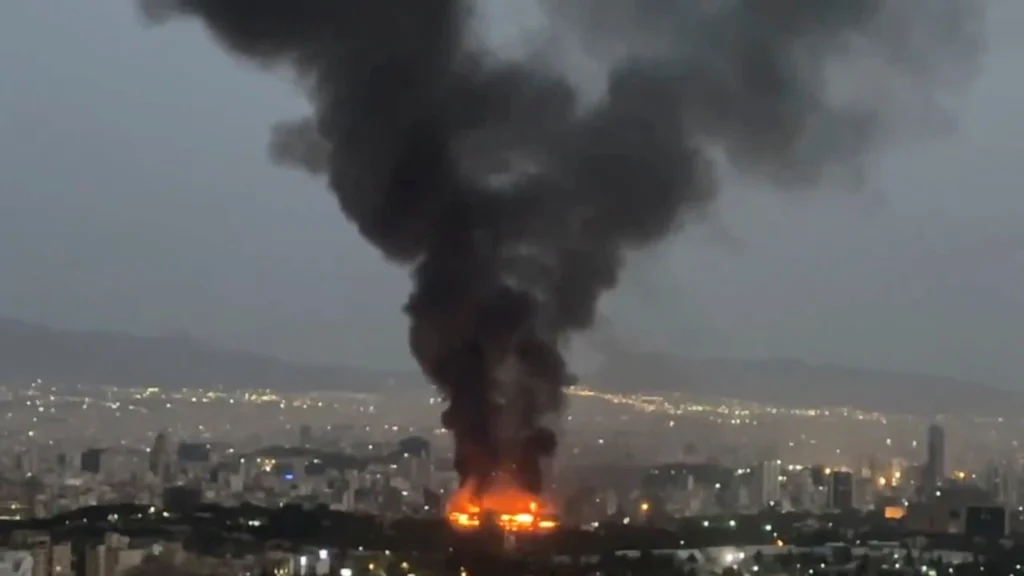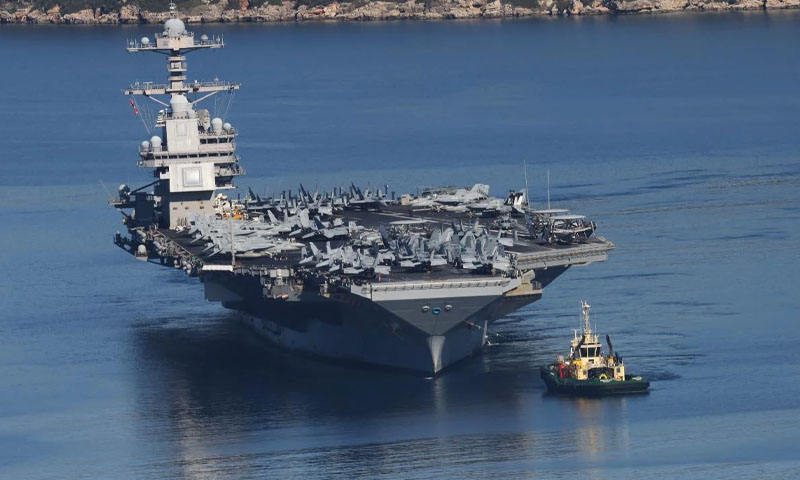- Web
- Today
Israel-Iran clash leads to slew of evacuations
-

- Reuters
- Jun 18, 2025

JERUSALEM/TEHRAN: Thousands of people were fleeing Tehran on Wednesday after Israeli warplanes bombed the city overnight, and a source said US President Donald Trump was considering options that include joining Israel in attacking Iranian nuclear sites.
An Israeli military official said 50 Israeli jets had struck around 20 targets in Tehran overnight, including sites producing raw materials, components and manufacturing systems for missiles. Israel told residents in a southwestern area of Tehran to evacuate so its air force could strike.
Iran responded with a fresh volley of missiles at Israel, and a new warning that it would respond against the United States if Washington joined the war.
Roads north out of Tehran were jammed with traffic.
“We left Tehran this morning. My children were frightened, and we’re going to stay at my brother’s house near Karaj,” Alireza, 37, a businessman, told Reuters by phone.
Arezou, 31, had made it out of the capital and was in the nearby resort town of Lavasan.
“We will stay here as long as this war continues. My friend’s house in Tehran was attacked and her brother was injured. They are civilians,” she told Reuters. “Why are we paying the price for the regime’s decision to pursue a nuclear programme?”
A flurry of social media posts from Trump on Tuesday, including a demand for Iran’s “UNCONDITIONAL SURRENDER!” and a post musing about killing Supreme Leader Ali Khamenei, increased speculation that he could bring the United States into the war.
A source familiar with internal discussions said Trump and his team were considering a number of options, which included joining Israel in strikes against Iranian nuclear sites.
Iran had conveyed to Washington that it would retaliate against the United States for any direct participation, its ambassador to the United Nations in Geneva, Ali Bahreini, said. He said he already saw the U.S. as “complicit in what Israel is doing”.
“We will not show any reluctance in defending our people, security and land – we will respond seriously and strongly, without restraint.”
Iran has been exploring options for leverage, including veiled threats to hit the global oil market by restricting access to the Gulf through the Strait of Hormuz, the world’s most important shipping artery for oil, which it controls.
A Former Iranian Economy Minister Ehsan Khandouzi, said on X that Iran should quickly start requiring permission for tankers transiting the strait, a move he said would be “decisive” if implemented quickly. Iran’s Oil Ministry and Foreign Ministry did not immediately respond to requests for comment.
Also read: Use of US bunker-buster bomb looms over Iran conflict
Israel launches airlift to bring home stranded citizens after Iran strike
Israel on Wednesday launched a phased airlift operation to bring home its citizens, after the country’s military strike on Iran closed air space across the Middle East, leaving tens of thousands of Israelis stuck overseas.
The first rescue flight, operated by national carrier El Al ELAL.TA, touched down at Tel Aviv Airport early Wednesday morning, returning passengers from Larnaca, Cyprus.
Worldwide, Israel’s transport ministry estimates that more than 50,000 Israelis, stranded after airlines halted flights to the country, are trying to come home.
Foreign citizens have also been fleeing Iran overland. China started evacuating its citizens from Tehran to Turkmenistan by overland bus on Tuesday. Hundreds of other foreign nationals fled to neighbouring Armenia and Azerbaijan.
El Al has said repatriation flights are already scheduled from Athens, Rome, Milan, Paris, Budapest and London. Smaller carriers Arkia and Israir ISRG.TA are also taking part.
“We are very emotional about receiving the first rescue flight as part of ‘Safe Return’,” Transportation Minister Miri Regev told the captain of the arriving El Al flight before it landed.
While many Israelis want to come back, around 38,000 tourists are stranded in Israel, with much of the country in lockdown, and all the museums and holy sites closed.
The Tourism Ministry said on Wednesday it would start coordinating flights out, while around 1,500 Americans on a Jewish heritage programme were evacuated to Cyprus via a cruise ship, which will now sail back with Israeli citizens aboard.
“We didn’t sleep for nights on end. We are all very exhausted and it’s a sigh of relief,” said Dorian, 20, from New York, after he had disembarked.
“In Israel, I was very afraid. I was never used to anything like that. Sirens, missiles, or anything like that. New York is pretty much very safe and this was new to me.”
Iran has fired more than 400 ballistic missiles at Israel since Friday, triggering air raid sirens and a rush to bunkers. At least 24 people, all civilians, have died so far in the strikes, according to Israeli authorities.
Iranian officials have reported at least 224 deaths, mostly civilians, though that toll has not been updated for days.
Tel Aviv’s Ben Gurion airport has been closed to passenger traffic since Israel launched its pre-dawn attack on Friday and commercial aircraft are sitting out the war in foreign air fields.
The Airports Authority reinforced staffing on Wednesday to ensure arriving passengers left the airport quickly. Relatives were advised to avoid travelling to pick up family members for security reasons.
The airlift is being carried out in stages, based on risk levels and security assessments, a spokesperson for the Airports Authority said.
Large numbers of Israelis seeking to get home have converged on Cyprus, the European Union member state closest to Israel. Flights from the coastal city of Larnaca to Tel Aviv take 50 minutes.
Nine flights were expected to depart Cyprus on Wednesday for Haifa, and four for Tel Aviv, carrying about 1,000 people, sources at Cypriot airport operator Hermes said.
Cruise operator Mano Maritime, whose “Crown Iris” ship carries 2,000 passengers, has said it will make two crossings from Cyprus to Israel’s Mediterranean port city of Haifa.
Also read: How the pizza orders predicted the recent Iran-Israel conflict?
Chinese travel thousands of miles to flee Iran overland
BEIJING, June 18 (Reuters) – The first Chinese evacuees from Iran have started sharing on social media their desperate efforts to reach the Islamic Republic’s borders and the safety of Turkmenistan, Armenia and Azerbaijan, as the Israel-Iran air war entered a sixth day.
Several thousand Chinese nationals are thought to reside in oil-rich Iran, according to state media reports, highlighting Beijing’s efforts to deepen strategic and commercial ties with Iran over the past two decades.
“My heart was pounding but amid the haze of war, everything became clear: I packed my bags and tried to evacuate to the embassy,” wrote a Chinese travel blogger under the alias Shuishui Crusoe, a nod to Daniel Defoe’s fictional castaway, Robinson Crusoe.
The travel blogger had decided to leave after sitting through Israel’s overnight bombings last Friday when the conflict began, even as the embassy advised her to stay put.
Emboldened by news of fellow citizens who made it across to Armenia, 750 km (500 miles) from the Iranian capital Tehran, she chose the same route, arriving by bus in the Armenian capital Yerevan on Monday, a day before China’s embassy officially urged its citizens to leave Iran.
China started evacuating its citizens from Tehran to Turkmenistan by bus on Tuesday, a distance of 1,150 km, state-run China News Service reported Wednesday.
Guo Jiakun, a spokesperson for China’s foreign ministry, said Beijing had not received any reports of Chinese casualties.
“Seven hundred and ninety-one Chinese nationals have already been relocated from Iran to safe areas, and over 1,000 more are in the process of being evacuated,” he told a regular news conference.
While the embassy emphasised evacuation, some other Chinese netizens still in Iran shared video compilations showing an orderly scenario of well-stocked grocery shops and fruit stalls, with only a couple of clips of large purchases of bottled water.
Most Chinese in Iran are engineers who moved there to work for Chinese firms that have invested just under $5 billion in the country since 2007 – primarily in its oil sector – according to data from the American Enterprise Institute think tank.
If the regime in Tehran is severely weakened or replaced, Beijing loses a key diplomatic foothold in a region long dominated by the U.S. but vital to President Xi Jinping’s flagship Belt and Road initiative and its aim to link the world’s second-largest economy with Europe and the Gulf.
China, the world’s leading energy consumer, has also benefited from importing heavily discounted Iranian crude, despite Washington’s sanctions aimed at curbing the trade.
Also read: Reza Pahlavi, son of Iran’s Shah, remarks on possible regime change suggest cooperation with Israel




